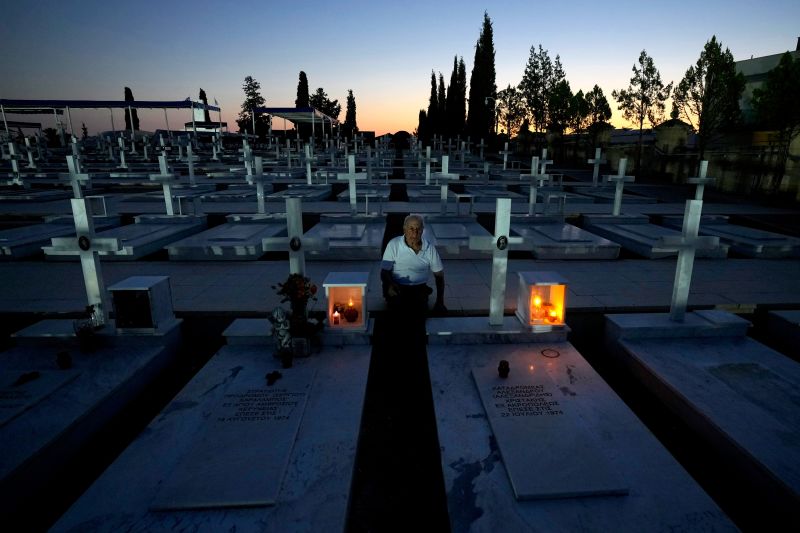
Greeks grieve, Turks celebrate as Cyprus marks 50 years of division
Air raid sirens wailed across Cyprus’s divided capital Nicosia at dawn on Saturday as Greek Cypriots mourned, and Turkish Cypriots celebrated, 50 years since Turkey invaded part of the island in response to a brief Greek-inspired coup.
The ethnically split island is a persistent source of tension between Greece and Turkey, which are both partners in NATO but are at odds over numerous issues.
Their differences were laid bare on Saturday, with Turkish President Recep Tayyip Erdogan attending a celebratory military parade in north Nicosia to mark the day in 1974 when Turkish forces launched an offensive that they call a “peace operation.”
Later in the day, Greek Prime Minister Kyriakos Mitsotakis was due to attend an event in the south of the city to commemorate what Greeks commonly refer to as the “barbaric Turkish invasion.”
Mitsotakis posted an image of a blood-stained map of Cyprus on his LinkedIn page with the words “Half a century since the national tragedy of Cyprus.”
There was jubilation in the north.
“The Cyprus Peace Operation saved Turkish Cypriots from cruelty and brought them to freedom,” Erdogan said, criticizing the south for having a “spoiled mentality” and seeing itself as the sole ruler of Cyprus.
But Erdogan left open a window to dialogue in deadlocked negotiations. “We are ready for negotiations, to meet, and to establish long-term peace and resolution in Cyprus,” he said.
Peace talks are now stalled at two seemingly irreconcilable concepts – Greek Cypriots want reunification as a federation. Turkish Cypriots want a two-state settlement.
Cyprus gained independence from Britain in 1960, but a shared administration between Greek and Turkish Cypriots quickly fell apart in violence that saw Turkish Cypriots withdraw into enclaves and led to the dispatch of a UN peacekeeping force.
The crisis left Greek Cypriots running the internationally recognized Republic of Cyprus, a member of the European Union since 2004 with the potential to derail Turkey’s own decades-long aspirations of joining the bloc.
Remembering the dead
Cypriot President Nikos Christodoulides, whose office represents the Greek Cypriot community in the reunification dialogue, said the anniversary was a somber occasion for reflection and for remembering the dead.
“Our mission is liberation, reunification and solving the Cyprus problem,” he said. “If we really want to send a message on this tragic anniversary … it is to do anything possible to reunite Cyprus.”
Turkey, he said, continued to be responsible for violating human rights and international law over Cyprus.
Across the south, church services were held to remember the more than 3,000 people who died in the Turkish invasion.
“It was a betrayal of Cyprus and so many kids were lost. It wasn’t just my son, it was many,” said Loukas Alexandrou, 90, as he tended the grave of his son at a military cemetery.
In Turkey, state television focused on violence against Turkish Cypriots prior to the invasion, particularly on bloodshed in 1963-64 and in 1967.
Turkey’s invasion took more than a third of the island and expelled more than 160,000 Greek Cypriots to the south.
Reunification talks collapsed in 2017 and have been at a stalemate since. Northern Cyprus is a breakaway state recognized only by Turkey, and its Turkish Cypriot leadership wants international recognition.
